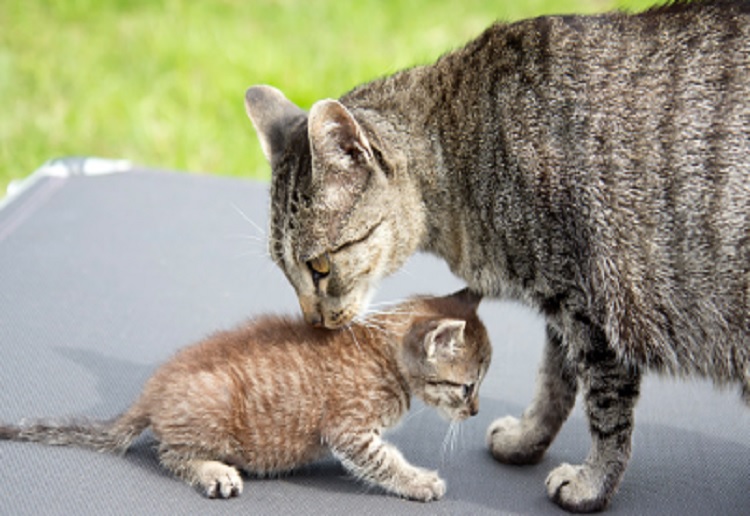For most mammals, the instinct to lick the newborn clean is natural. So why don’t we?
Licking removes the amniotic fluid from the new baby, according to veterinary professors Donald M. Broom and Andrew F. Fraser in their book Domestic Animal Behavior and Welfare.
This keeps the infant warmer because thick amniotic fluid conducts heat away from the body. But licking also stimulates the newborn.
It could also be health-related — “removing any nasty creatures on the surface of the skin, such as bacteria, viruses, that sort of thing,” Dugatkin says.
Another reason, Dugatkin explains, relates to the mother recognizing the baby. “It may be the start of a chemical recognition system between mothers and offspring. Licking is one way to get that sorted out. There are all sorts of bonding behaviors that go on between mother and offspring,” and licking may be one of those “early chemo-tactile links” that the mother has to her baby.”
So why don’t human mothers do it?
A major reason may be that humans no longer need to. “There hasn’t been [evolutionary] selection for licking your offspring. We can clean without licking,” says Lee Dugatkin, an evolutionary biologist at the University of Louisvill Humans. We do have hands!
“My guess is that we have so many other ways to get the benefits and information associated with licking,” he says. “Visual and tactile senses in humans are very strong,” and so selection might be weaker for a licking behavior. “We rely so heavily on … more sophisticated cognitive behavior. My guess is that licking is not as useful,” he says.
However anthropologist Ashley Montagu theorized that human beings don’t lick their young because humans have relatively long labours compared with most mammals.
He wrote that skin and body stimulation of the infant is important because it sets in motion the proper development of organ systems: Licking provides that stimulation, but so do uterine contractions in long labours.
Because of the stimulation provided by a long labour, licking after birth is less necessary, Montagu concluded. You can read more on the topic here.
Why you should rub in vernix, not scrub it off
The vernix acts like a waterproof barrier on your baby’s skin, protecting it from the drying effects of months of submersion in amniotic fluid. In addition, scientists now believe that it may also have antibacterial and cleansing properties.
Research has shown that the smell of vernix can trigger the “love” hormone in the parent of a newborn.
Check out a gallery of beautiful baby’s coated in vernix HERE.
Did you have the urge to lick your baby after birth?
Share your comments below.




















-

-
-
Bela said
- 24 Feb 2018
-

-
-
Ellen said
- 11 Feb 2018

-

-
-
ella12 said
- 05 Feb 2018
-

-
-
tessie said
- 04 Feb 2018
-

-
-
rachel1970 said
- 04 Feb 2018
-

-
-
mom101628 said
- 03 Feb 2018
-

-
-
mom19782016 said
- 03 Feb 2018
-

-
-
nealsq said
- 31 Jan 2018
-

-
-
ashna9 said
- 31 Jan 2018
-

-
-
mom160421 said
- 31 Jan 2018
-

-
-
mom206279 said
- 31 Jan 2018
-

-
-
mom90758 said
- 31 Jan 2018
Post a comment10:13 pm
3:40 am
4:28 pm
10:31 am
9:00 am
9:43 pm
8:21 am
10:30 pm
8:43 pm
8:06 pm
6:05 pm
-

-
-
june11 replied
- 10 Feb 2018 , 11:52 pm
Reply2:06 pm
To post a review/comment please join us or login so we can allocate your points.